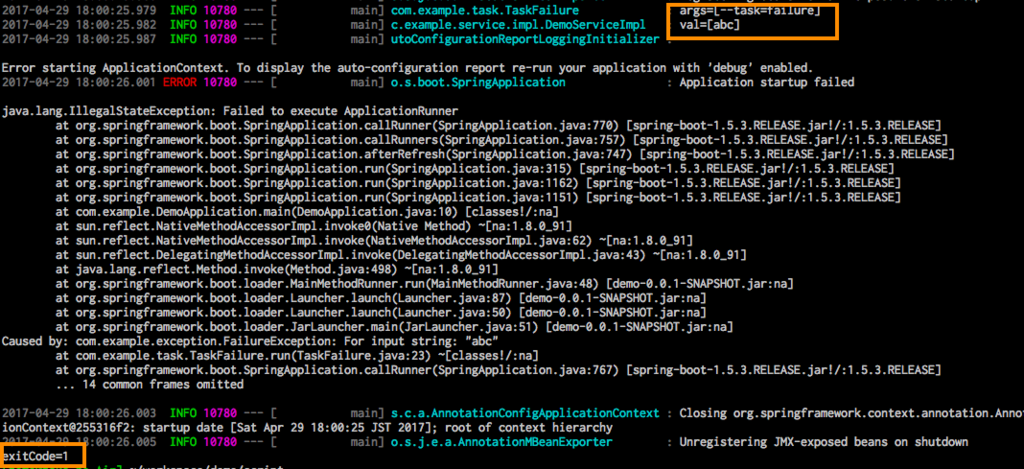Spring Boot Multiple Application Runner
This is very simple example using Spring Boot with 2 stand alone application in 1 project.
The point is you need Java config class and a class which implements ApplicationRunner Interface(or CommandLineRunner) for each job.
And use @ConditionalOnProperty as parameter when execute this.
Moreover if you want it to exit with execution's status like 0 or 1, just throw RuntimeException implements ExitCodeGenerator Interface throws exit code.
- Java config
- ApplicationRunner
- package tree

- TaskSuccess execution log
java -jar build/libs/demo-0.0.1-SNAPSHOT.jar --task=success
You can see the arguments [--task=success] in the log.

- TaskFailure execution log
java -jar build/libs/demo-0.0.1-SNAPSHOT.jar --task=failure You can see the exit code is 1:Failure in the log.

- DemoApplication.java
@SpringBootApplication public class DemoApplication { public static void main(String[] args) { SpringApplication.run(DemoApplication.class, args); } }
TaskSuccess
- TaskSuccessConfig.java
@Configuration @ConditionalOnProperty(name={"task"}, havingValue="success") public class TaskSuccessConfig { @Bean public ApplicationRunner getRunner() { return new TaskSuccess(); } }
- TaskSuccess.java
public class TaskSuccess implements ApplicationRunner { private static final Logger logger = LoggerFactory.getLogger(TaskSuccess.class); @Autowired private DemoService demoService; @Override public void run(ApplicationArguments args) throws Exception { logger.info("args=[{}]", args.getSourceArgs()); try { demoService.convertInt("123"); } catch (Exception e) { throw new FailureException(e.getMessage()); } } }
TaskFailure
- TaskFailureConfig.java
@Configuration @ConditionalOnProperty(name = { "task" }, havingValue = "failure") public class TaskFailureConfig { @Bean public ApplicationRunner getRunner() { return new TaskFailure(); } }
- TaskFailure.java
public class TaskFailure implements ApplicationRunner { private static final Logger logger = LoggerFactory.getLogger(TaskFailure.class); @Autowired private DemoService demoService; @Override public void run(ApplicationArguments args) throws Exception { logger.info("args=[{}]", args.getSourceArgs()); try { demoService.convertInt("abc"); } catch (Exception e) { throw new FailureException(e.getMessage()); } } }
common class
- FailureException.java
public class FailureException extends RuntimeException implements ExitCodeGenerator { private static final long serialVersionUID = 1L; public FailureException(String message) { super(message); } @Override public int getExitCode() { return 1; // you can set the exit code here } }
- DemoServiceImpl.java
@Service public class DemoServiceImpl implements DemoService { private static final Logger logger = LoggerFactory.getLogger(DemoServiceImpl.class); @Override public void convertInt(String val) { logger.info("val=[{}]", val); Integer intVal = Integer.valueOf(val); logger.info("int val=[{}]", intVal); } }
whole code is here.
github.com
I really enjoy coding with Spring Boot!!!
keep coding ;-)